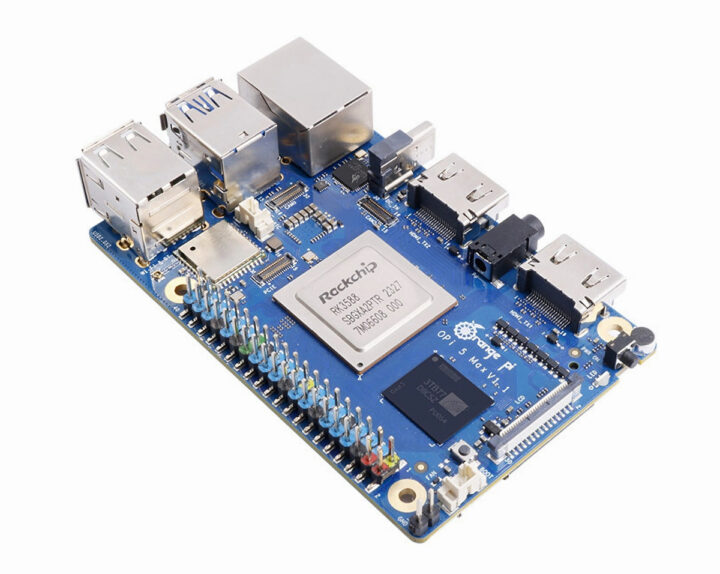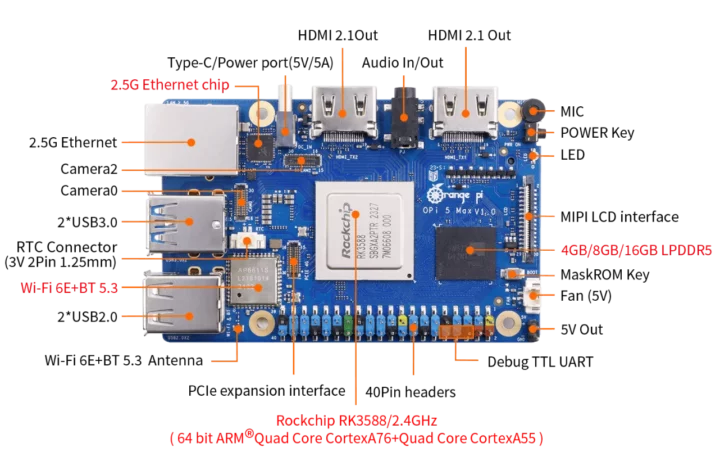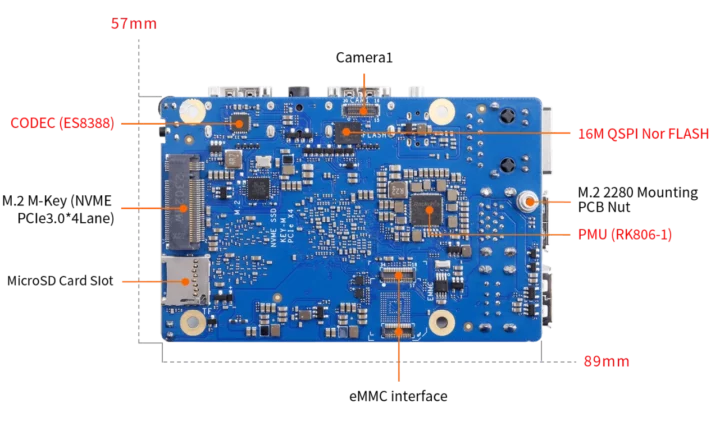Initially teased at the Orange Pi Developer Conference earlier this year, the Orange Pi 5 Max SBC powered by a Rockchip RK3588 SoC is now available on Amazon and Aliexpress for $95 and up with 8GB or 16GB LPDDR5, and support for eMMC flash modules or soldered on eMMC flash. A 4GB RAM version is also planned for $75.
The Orange Pi 5 Max is basically a cost-down version of the Orange Pi 5 Plus with fewer interfaces (e.g. 1x 2.5GbE vs 2x 2.5GbE, no HDMI input, etc..), higher bandwidth LPDDR5 memory, onboard WiFi 6E and Bluetooth 5.3, and a smaller form factor between Pico-ITX and credit card size.
Orange Pi 5 Max specifications:
- SoC – Rockchip RK3588
- CPU – Octa-core processor with 4x Cortex-A76 cores @ up to 2.4 GHz, 4x Cortex-A55 cores @ up to 1.8 GHz
- Arm Mali-G610 MP4 GPU with support for OpenGL ES1.1/2.0/3.2, OpenCL 2.2, and Vulkan 1.2
- 6 TOPS AI accelerator with support for INT4/INT8/INT16/FP16 mixed operation
- VPU – 8Kp60 H.265/VP9/AVS2 10-bit decoder, 8Kp30 H.264 decoder, 4Kp60 AV1 decoder, 8Kp30 H.265/H.264 encoder
- System Memory – 4GB, 8GB, or 16GB LPDDR5
- Storage
- eMMC flash socket for 32GB, 64GB, 128GB, or 256GB module or eMMC flash chip soldered on-board (co-lay)
- 16MB QSPI NOR Flash
- MicroSD card slot
- M.2 2280 PCIe 3.0 x4 socket for NVMe SSD
- Video Output
- 2x HDMI 2.1 ports up to 8Kp60
- 4-lane MIPI DSI connector up to 4Kp60
- Camera I/F
- 2x 4-lane MIPI CSI connectors
- 1x 4-lane MIPI D-DPHY Rx connector
- Audio
- ES8388 audio codec
- 3.5mm audio jack with headphone and microphone support
- Onboard MIC
- Support for HDMI 2.1 eARC
- Networking
- 2.5GbE RJ45 port via RTL8125BG controller
- Onboard WiFi 6E and Bluetooth 5.3 module (AP6611) using SDIO 3.0 for WiFi, UART and PCM for Bluetooth; IPEX antenna connector
- USB – 2x USB 3.0 ports, 2x USB 2.0 ports
- Expansion
- 40-pin header with GPIO, UART, I2C, SPI, CAN, PWM, and others
- M.2 Key-M socket (PCIe 3.0 x4) for a 2280 NVMe SSDs, or other PCIe 2280 modules (e.g. AI accelerators)
- Debugging – UART on 40-pin header
- Misc
- Power and MaskROM buttons
- Power LED
- 2-pin 5V fan connector
- 2-pin connector for RTC backup battery
- Power Supply
- 5V/5A via USB Type-C port
- RK806-1 PMU
- Dimensions – 89 x 57 mm
- Weight – 62 grams
Orange Pi provides support for Orange Pi OS (Android, Arch, or OpenHarmony), Ubuntu 20.04/22.04, Debian 11/12, OpenWrt (I’m not sure why), and Android 13. You’ll find all those images and source code on the Download page.
Official pricing for the board is:
- $75 with 4GB RAM
- $95 with 8GB RAM
- $125 with 16GB RAM
You can get those prices on AliExpress where you’ll also find accessories, or pay a little more on Amazon. Versions with soldered-on eMMC flash are not available yet but might be made upon request (possibly with MOQ). Additional information may be found on the product page.

Jean-Luc started CNX Software in 2010 as a part-time endeavor, before quitting his job as a software engineering manager, and starting to write daily news, and reviews full time later in 2011.
Support CNX Software! Donate via cryptocurrencies, become a Patron on Patreon, or purchase goods on Amazon or Aliexpress








I’m still waiting for all the hardware capabilities to be realised in software, 2 years down the line.
A truly dreadful company with zero support.
Just a box shifter masquerading as something else. The vaunted and woefully executed Orange Pi OS, a crucial element of the initial marketing of the Orange Pi 5 that still hasn’t had a single update since April 2023 is just one example to show it.
And as for the continual models with rather embarrassing names ….
What is next? The Plus Pro Max Ultimate edition?
I will never purchase from them again.
first world problems..
> The Plus Pro Max Ultimate editio
No, you’re referring to multiple products at once 🙂
You need on only combine all these words two at a time, it offers more combinations. And you can add “Ultra” into the mix.
LOL
Lack of support of some boards /Rockchip/ is main reason why I am not keen to buy anything more expensive than rpi5.
I have seen many attempts to sell these on ebay but there was not interest unless it was for half price or so. Raspberry Pi you are able to sell for nearly same price like you bought it and this is what market tells you about the real value.
Orangepi OS is just static unmaintained fork of Armbian branded as Orangepi OS. Orangepi is HW company.
The problem with them is that they’re selling hardware that is supported by no software. It’s fine to be HW-only but then they should partner with software companies to do the other part of the work.
@Bill @Willy There’s instructions over at OrangePi’s wiki about building and flashing armbian here: http://www.orangepi.org/orangepiwiki/index.php/Orange_Pi_5_Plus#How_to_burn_Linux_image_to_eMMC
They reference this OrangePi repo which seems up-to-date: https://github.com/orangepi-xunlong/orangepi-build
I’ve also noticed armbian offer orangepi binaries directly while @Lothar have pointed out to: https://github.com/Joshua-Riek/ubuntu-rockchip/
So, my guesstimate is that armbian is tracking their sources so tightly that they decided not to bother with rolling their own distro like raspbian but are instead only making sure their wiki is up-to-date and the tools and procedures are well documented.
An informative and kind reply!
Do you know what is quite interesting when you buy early access games? It is cheaper than final product because it is simply unfinished product.
So can somebody explain to me why all these “demo” boards are more expensive than functional Raspberry Pi 5?
In most cases it is matter of years before you get final software side.
It’s simple: the devices are way more capable, so everyone hopes to quickly get access to the full feature set. And when they do, the board is 2-years old and you figure that for the same price you got an equivalent x86 board.So the motivation is device capabilities at a point in time. For example when I bought mu MiQi boards a while ago (RK3288), they were the fastest fanless devices one could find, and well suited for my build farm. When I was offered the ROCK 5B for testing two years ago, it would have been the best option to replace my aging file server, because it had great PCIe bandwidth and pretty decent performance. But due to poor software I finally replaced my file server with an Odroid-H3 (x86) and kept the rock5b for development and testing. My Odroid-M1 (RK3568) replaced my backup server a while ago thanks to its full support in mainline, and remains the best option for that task. Now I’ve been offered a ROCK 5 ITX for testing and figured it definitely is a technically superior option than Odroid-H3 for my file server and have prepared for an upgrade. I just haven’t done it yet because I’m not fine with offering my data to that BSP kernel, so it stays on my desk for development purposes and testing to help other developers and users. Maybe once it’s ready I’ll find fanless x86 solutions capable of 10 GbE as well…
You have joshuas ubuntu framework and armbian.
@Bill
Have you tried ubuntu-rockchip version? From Joshua-Riek?
a rockchip post > people crying about software…
Yep, people need to reminded every time to avoid these boards if they’re looking for more than a paperweight.
Alex,
Calling the new Orange Pi 5 Max SBC a ‘paperweight’ is inaccurate because a) many customers are using them, not as paperweights b) the whole ARM-linux community has been struggling to adapt, maintain bsp and mainline drivers for over 14 years. Only a small group of heroic devs have been working on open source graphics drivers, for example.
You must be new here if you didn’t know that ARM-linux has suffered painfully incomplete hardware support since,.. the beginning of time.
So… welcome to the cnx-software.com comments!